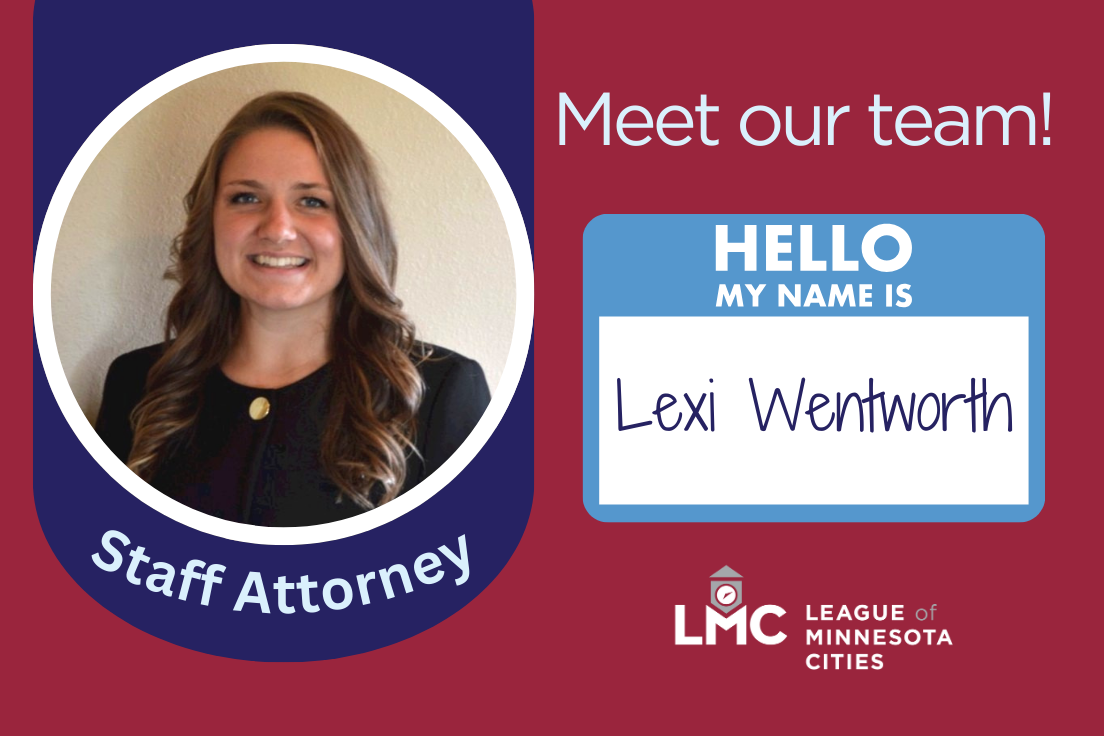Meet Our Team: Q&A with Staff Attorney Lexi Wentworth

Do you have a question about Minnesota cities? Our research team has an answer for you!
In our Q&A, League Staff Attorney Lexi Wentworth shared what research team members are currently working on and what services they can provide Minnesota cities.
Please describe the work your team does.
We answer questions about many different issues and obligations that city officials or city staff have on a daily basis. We do a lot of interacting with elected officials, city staff, and city attorneys. We do a lot of research and just dig into whatever questions we can help them answer—whether that be procedural questions or questions about roles and responsibilities.
We also help cities comply with the Minnesota Government Data Practices Act, draft and revise the research materials that are all over our website, and we give presentations on those topics to help city staff in their roles.
What schooling and work experience did you have before taking this role?
I have a Bachelor of Science from the University of Minnesota. I also have my law degree from the University of St. Thomas Law School, and I’m a licensed attorney in the state of Minnesota. Most people on our team do have a law degree, but it’s not a requirement.
I worked for a municipal law firm while in undergrad and law school. I also worked on the League of Minnesota Cities Insurance Trust side as a law clerk before working as a staff attorney with the League.
What does your team work on and what services do you offer cities during the legislative session?
During session, we mostly work with the League’s intergovernmental relations (IGR) team and address any questions they have for legal research. We try to do whatever we can to support them on the backend when questions arise from legislators or city employees who might have questions about what’s going on at the legislature. We provide resources, guidance … anything we can find that will help support them.
We chat with members and cities during session, but we aren’t at the Capitol with the IGR team, so we don’t always know what’s going on on a daily basis. We usually send members to IGR if they have questions about the status of a bill or its future.
After session, we step in and say, ‘OK, these laws have passed—or they didn’t pass—and what does that mean for our cities? How does this effect our cities? What can we do to help cities implement whatever changes came in the legislative session?’ We update our resources to reflect whatever changes were made. We are kind of on both sides, but I would say more of our responsibility comes after session is over.
What role do you play with the League’s law summaries?
Members from our team will be assigned to each summary in case the member from IGR who is writing that summary wants any help, but usually members from the IGR team are the ones writing the summaries.
What are your top priorities during the summer months? What are you working on now?
The biggest thing in the summer months is looking at the new laws passed by the legislature and helping cities implement their required changes. Sometimes it’s not always clear what cities need to do, and that’s where we step in.
Three big topics we will be looking into this summer are Americans with Disabilities Act (ADA) compliance for websites, Earned Sick and Safe Time (ESST), and cannabis—how it’s changed from last year and how it will be implemented in 2025.
For me, one of my colleagues and I are starting a Roles and Responsibilities Training Program for cities. We are working with Aimee Gourlay from LMCIT on this, and we are starting to form ideas about how we can work with cities and help them in areas they may need more training in. We will go out and see what we can do to provide that training and answer any questions cities may have.
What is one thing you wish more members knew about your team?
I ran this by my team, and I think we all kind of had the same answer. We want members to know we cannot provide legal advice. A lot of members on our team are attorneys, and a lot of cities try to ask us for legal advice. We are here to help with questions—big or small—and we love to help when we can, but we legally can’t provide legal advice. When we advise a member to get help from their city attorney, we don’t just tell them, ‘Hey, go to your city attorney.’ We give them resources; we’re not trying to just pass them off to someone else.
The other thing I would tell members is to reach out when you have questions—big or small. Even if we aren’t able to help in the legal capacity, we are going to find all of the resources we can and help in whatever ways we can.
Why do you do what you do?
I love that every day is different. We have a whole different, broad variety of topics we touch. I also love being able to work with city staff and a variety of different people throughout the whole state. Sometimes we work with big cities, sometimes we work with small cities. All are different and unique, and it’s just fun to have that variety every single day.

